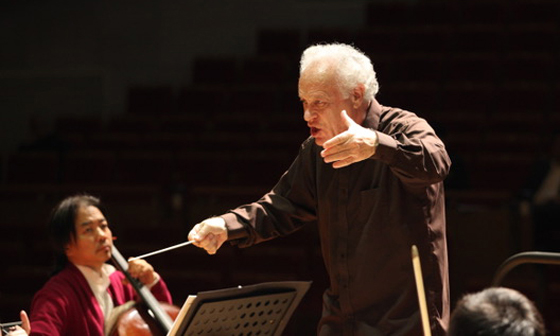

SAN DIEGO — Following his successful guest conducting engagement with China’s Beijing Symphony Orchestra last month, Israeli Conductor, Yoav Talmi, was immediately reengaged for another season.
The manager wrote, “Those who attended the concert could testify to the wonderful work he has done with our orchestra.”
As Talmi continues to receive accolades for his guest conducting throughout the world and his inspiring teaching at the Buchmann-Mehta School of Tel Aviv University, the internationally acclaimed maestro is also garnering increased recognition as a world class composer.
His recent CD, Yoav Talmi COMPOSITIONS, released by the Israel Music Institute and produced with the support of the Ministry of Culture and Sport, contains three of his large compositions, De Profundis, a four movement work for mixed choir and orchestra; Animi Motus, a four movement work for orchestra with children’s or women’s choir; and Elegy for strings, timpani and accordion (Dachau Reflections).
I feel a strong connection to those compositions. For seven years, I was privileged, as a violinist in the San Diego Symphony Orchestra, to play under Maestro Yoav Talmi. During this time, I was impressed by his sincere devotion to validly interpret other composers’ music. That was his loyal mission.
It was only after he left the SDSO, that I became fully acquainted with Talmi, the composer.
Inspired by a visit to Dachau as conductor of the Israel Chamber Orchestra, Talmi wrote one of the compositions featured on his recently released CD, Elegy for strings, timpani and accordion (Dachau Reflections).
After Talmi composed Elegy in 1997, he granted permission to San Diego’s California Ballet Company to choreograph the work. I was in the violin section of the pit orchestra that accompanied the performance. The use of the Holocaust song, “Under the Starry Sky;” the quote from Bach’s cello sonata; the accordion, evoking a ghetto musician; all gives the work a unique, spell-binding character.
I was also a member of the Lawrence Family JCC Music Committee, under the lay leadership of Roselyn Pappelbaum, and staff person, Jackie Gmach, that arranged the JCC concert, The Talmi’s Play Talmi. The final work on that program was a repeat of the choreography set to Elegy. This time, it was danced to a recording of the work. Once again, the music and the dance left a strong impression.
Finally, when, in 2006, Yoav Talmi was invited to guest conduct the San Diego Symphony, he programmed Elegy. I was in the audience, hearing the work conducted by its composer, and once again, feeling its strong emotional impact.
In December, 2010, on a visit to Israel, I was a guest in the Talmi’s apartment in Kfar Saba and witnessed how
the maestro arose in the early hours of the morning to compose. He was working on De Profundis, the piece that earned him the coveted Prime Minister’s Prize.
He told me about his concept of having the work sung in multi-languages, and, at the beginning of the final movement, the soul-stirring Psalm text, “Out of the depths I have cried to Thee, O Lord,” would be sung simultaneously in Hebrew, Latin, French and English. This unusual texture of sound illustrates Talmi’s innovative creativity as he crafts unusual effects through existing instruments and voices.
The third work on the CD, Animi Motus (Feelings), for orchestra with children’s or women’s choir, was composed in 2013. In this piece, Talmi utilizes the human voice as a wordless instrument in the orchestra, entering in combination and singly. Although the technique of wordless voices has been used by Debussy in the “Sirens” movement of Nocturnes and by Holst in the “Neptune” movement of The Planets, Talmi
takes it to new heights, integrating the human voices throughout most of the movements.
His mastery of instrumentation and of dynamic contrasts is evident in his music. The opening crescendo of the first movement, “Meditation,” from a barely audible sound in the lowest registers to a full-blown fortissimo of the entire orchestra is a remarkable ascent of emotional tension. The second movement, “Alienation,” communicates the lack of warmth in our computerized world. The third movement, “Memoirs,” has prominent flute sections, and beautiful woodwind passages. It echos Talmi’s very first composition, Music for Flute and Strings (1967), which he dedicated to his wife, Er’ella.The final movement, “Agitato,” leaps forward, with rapid repeated notes, agitated motion and irregular accents, into a climactic finale.
This CD, Talmi COMPOSITIONS, was presented to me by Yoav and Er’ella Talmi on the occasion of my 90th birthday. Their presence at my milestone celebration and this wonderful gift of music are treasures I will always cherish.
*
Eileen Wingard is a freelance writer specializing in coverage of the arts. She may be contacted via eileen.wingard@sdjewishworld.com